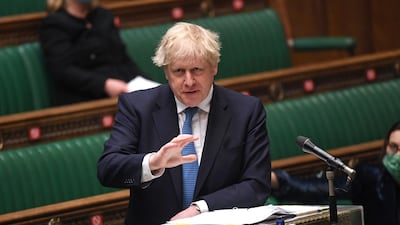Britain announced it would give £55 million ($77.5m) to a new aid programme that will support research into education reforms in the developing world and improve access to learning for young people.
The What Works Hub for Global Education will advise governments in Africa and Asia “on the most impactful and cost-effective ways to reform school systems and support female enrolment”.
UK Foreign Secretary Dominic Raab said the project would “help schools target teaching to the right level of pupil understanding, explain the benefits to parents of sending their daughters to school, and measure the effectiveness of school programmes and reforms aimed at keeping girls in the classroom”.
On Thursday, Prime Minister Boris Johnson will connect virtually with a school in Kenya as part of the UK’s drive to get 40 million more girls into the classroom over the next five years.
Joining the call will be Kenya's President Uhuru Kenyatta and Julia Gillard, Australia's former prime minister and now chairwoman of the Global Partnership for Education, the UN-backed body seeking to raise at least $5 billion over the next five years to improve education systems in the developing world.
The UK and Kenya will host a summit in late July to support the fundraising campaign.
“Supporting girls to get 12 years of quality education is one of the smartest investments we can make as the world recovers from Covid-19. Otherwise we risk creating a lost pandemic generation,” Mr Johnson said.
“Across the world there is a vast untapped resource – girls whose education has been cut short or denied altogether, who could be leading efforts to pull their communities out of poverty.
“I’m going to be working throughout the UK’s G7 presidency to ensure leaders invest in those girls and boost children’s life chances around the world.”
Last year, about 1.6 billion children were out of school because of the pandemic, with those in the developing world at greater risk of being adversely affected by classroom closures.
Ms Gillard said the July summit offered a “critical opportunity” to support GPE’s effort to bolster education.
“Covid-19 has worsened the global education crisis and hit children in lower-income countries the hardest, with life-changing consequences for millions,” she said.
“Now, we are at a decisive junction. When the world builds back from the pandemic, ensuring that every girl and boy has the opportunity for a quality education is the single best investment we can make for a more sustainable, peaceful and resilient future.”
Mr Kenyatta said the GPE provided “critical catalytic funding” that helped improve education quality and equity.
“Protecting domestic education budgets and ensuring that we do not lose education momentum because of the Covid-19 pandemic will enable us to create more prosperous and resilient economies.
“We need to make smart investments in education technology to help close the digital divide and leapfrog infrastructure deficits in schools,” he said.











